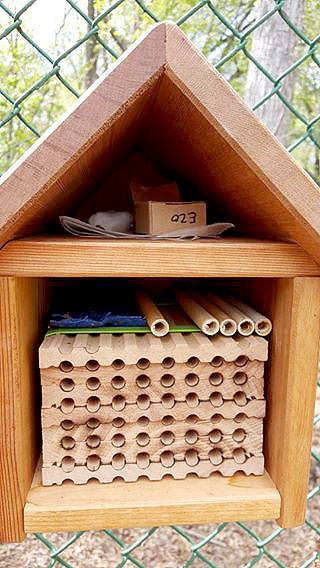
(right) The wooden block is for bees to nest in.
Each bee will pick one hole and stick with it until it’s full of eggs. The reeds are just to make it more visually interesting for them. The blue cloth is doused with mason bee attractant, to help them stay (and maybe attract some wild ones). The little cardboard box is full of bee cocoons. In the back is a cotton ball soaked in sugar water so they have some food for when they first awaken. They’re tired and hungry after not eating all winter!
The Union Community Garden has a new addition in the corner of the butterfly garden. The garden is located at the Eleanor R. Erickson Park on Liberty Avenue in Union NJ. The entrance is directly across from Bancroft Ave.
Please welcome our awesome new pollinators, the mason bees. Mason bees are solitary bees and because they have no hive to defend, they are very unlikely to sting (they are not aggressive at all – you’d have to actually step on them or squish them). And if they do sting, it’s about as bad as a mosquito bite and does not produce the severe anaphylactic reaction that honey bees have.
Unlike honeybees (which were brought over by European settlers) mason bees are native to the U.S. and are much better pollinators too.
We’re hoping having these gentle bees around will help our garden grow better than ever! Mason bees are spring bees, so in June they will be replaced with leafcutter bees, which are active in the summer. Like the name implies, they do cut leaves to make their nests but don’t worry, they won’t harm the plants. They take just as much as they need. Also solitary and not aggressive, the leaf cutters will continue to help us with our pollination after the mason bees are done for the year.
Check out this informative page on mason bees. And if you want, you can learn how to host them in your own back yard! crownbees.com/learn-mason-bees
